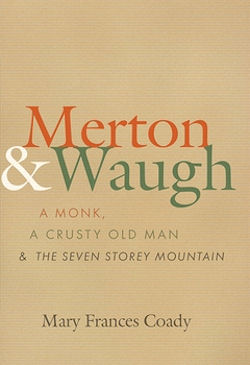
|
Posted April 22, 2015
Book: Merton & Waugh: A Monk, A Crusty Old Man & The Seven Storey Mountain Author: Mary Frances Coady Paraclete, Brewster, Massachusetts. 2015., Pp. 155 An Excerpt on Contents:
The lives of these two famous and controversial writers converged for a brief time. Both their fame and the controversy surrounding them have increased over time: Waugh the peerless prose writer, the champion of Catholicism. A snob? A reactionary? Merton the Trappist monk and tireless spiritual writer. A hypocrite? A narcissist? A slapdash writer? What did two such dissimilar characters have in common? Find out in this singular study of their correspondence and relationship. Twenty letters: thirteen from Merton and seven from Waugh, intended only for each other, make stimulating reading, in all of their spontaneity and frankness. In addition to expertly editing the correspondence, Mary Frances Coady sets the scene perfectly in her Introduction: "In the early summer of 1948, the British novelist Evelyn Waugh, low in spirits because of unrelenting rain and an itchy nettle rash, received a manuscript in the mail from an American publisher, along with a request for an endorsement. . . " An Excerpt from the Book: The Entralling Task What was it about The Seven Storey Mountain that elicited Evelyn Waugh's excitement and praise? As a student in Oxford, Waugh had mocked religious ritual while becoming increasingly attracted to it. In the first flush of fame as the author of two celebrated novels, Decline and Fall and Vile Bodies, he became a somewhat reluctant Catholic in 1930 at the age of twenty-seven after receiving instructions from the Jesuit Martin D'Arcy. "I realise that the Roman Catholic Church is the only genuine form of Christianity," he had written to Father D'Arcy a few weeks earlier. "Also that Christianity is the essential and formative constituent of western culture. In our conversations and in what I have read or heard since, I have been able to understand a great deal of the dogma and discipline which seemed odd to me before." The only problem, he said, was that "I don't feel Christian in an absolute sense. The question seems to be --- must I wait until I do feel this --- which I suppose is a gift from God which no amount of instruction can give me, or can I become a Catholic when I am in such an incomplete state and so get the benefit of the sacraments and receive Faith afterwards?" Waugh's friends later speculated that his world was in chaos during that period of his life because his wife had deserted him, and he was wandering homeless from one friend's country house to another. Catholicism's discipline and ritual helped keep the turmoil in check. His inner world had always contained a terrifying disorder that erupted in savagely comic novels and in a misanthropic attitude, bordering on cruelty, toward others. What impressed Father D'Arcy was that at the time of his conversion Waugh, a divorced man, thought he would never be able to remarry and have children, and yet he was willing to make this sacrifice. [He would later receive an annulment and remarry.] Also, although Waugh regarded Catholicism as a bastion against modernity he eventually came to detest, especially after the Second World War, more profoundly he saw the church's teaching on prayer and charity exemplified in the lives of the saints. These became a guide for his own practice and behavior, and he knew that he came up woefully short at every turn. His Christian charity, however, came through in generous donations to struggling church organizations and articles for such Catholic publications as The Tablet and The Month, for which he received very little remuneration. Waugh's novel Brideshead Revisited published in 1945, brought him renewed fame. He described the book as an attempt to show the action of divine grace on a particular family. It was a wealthy, aristocratic Catholic family, and creating characters within this milieu revealed Waugh's predilection for that kind of society. Beyond that, however, it indicates a certain kind of Catholic Church in Waugh's imagination --- on the one hand, an all-or-noting Catholicism, and on the other, a Catholicism that embraces everyone, from the steely other, steadfast oldest son, and pious schoolgirl, to the renegade father, wayward daughter, and alcoholic younger son. All are God-haunted in some way, but God's mercy is shown particularly to the family's outcasts. Table of Contents: 1. I came into the world 2. The enthralling task 3. Faults of style are largely faults of character 4. Elected silence 5. The American epoch 6. Waters of silence 7. I keep you occasionally in my Mass 8. A crusty old man References |
|
